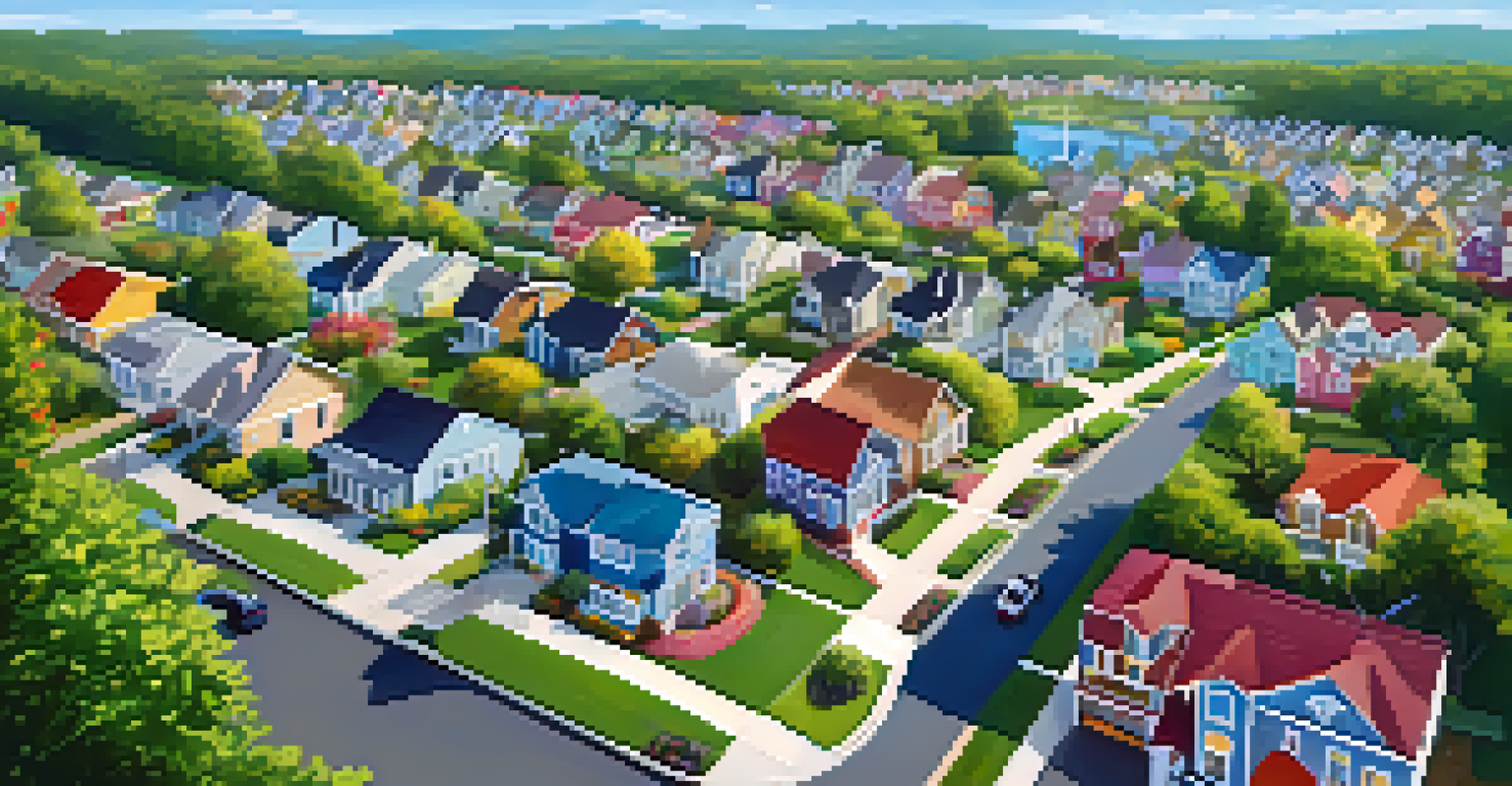The Power of Virtual Tours in Selling Homes Effectively

Understanding Virtual Tours and Their Rise in Popularity
Virtual tours are immersive digital experiences that allow potential buyers to explore a property from the comfort of their own home. With advancements in technology, these tours have gained significant traction, especially during the pandemic when in-person showings became challenging. They present a 360-degree view of homes, providing an engaging way for buyers to visualize living in the space without physically being there.
Virtual reality is not just a tool; it’s a portal to new experiences.
The rise of virtual tours can be attributed to changing buyer preferences. More people are looking for convenience and efficiency when searching for their next home. Virtual tours fulfill this need by offering a comprehensive look at properties, allowing buyers to filter their options more effectively and focus only on homes that truly interest them.
Additionally, virtual tours can broaden the reach of a property listing. Sellers can attract buyers from different cities or even countries, significantly expanding their potential market. This increased exposure can lead to quicker sales and often at better prices, making virtual tours a powerful tool in real estate.
Enhancing Buyer Engagement with Virtual Experiences
One of the most significant benefits of virtual tours is their ability to engage buyers in a more interactive way. Traditional listings often rely on static images, which can fail to convey the true essence of a home. In contrast, virtual tours allow buyers to navigate through rooms, zoom in on details, and even get a feel for the flow of the space.

This level of interactivity can create a more emotional connection between the buyer and the home. When potential buyers are allowed to 'walk through' a property, they can better envision their lives there, making it easier for them to imagine themselves in that space. This emotional engagement can be a decisive factor in making an offer.
Virtual Tours Boost Property Sales
Virtual tours enhance property visibility and attract buyers from broader markets, leading to quicker sales.
Moreover, virtual tours can address common buyer questions on the spot. By allowing buyers to explore a home at their own pace, they can take the time they need to evaluate spaces and features that matter most to them, leading to a more informed decision-making process.
Cost-Effectiveness of Virtual Tours in Real Estate
Implementing virtual tours can be a cost-effective strategy for real estate agents and sellers alike. While there may be initial costs associated with creating high-quality virtual experiences, these costs can be offset by faster sales and reduced marketing expenses. A well-executed virtual tour can attract more buyers without the need for extensive open houses and showings.
The future of real estate marketing lies in immersive technology that engages buyers like never before.
Additionally, virtual tours can save both time and resources. Agents can filter out uninterested buyers who may not be serious about the property after experiencing a virtual tour, allowing them to focus on qualified leads. This efficiency can lead to a higher conversion rate, making the selling process smoother and less resource-intensive.
In the long run, investing in virtual tours can also enhance a real estate agent's brand. Offering cutting-edge technology can set agents apart in a competitive market, attracting tech-savvy buyers who appreciate innovative sales techniques.
Strengthening Your Online Presence with Virtual Tours
In the digital age, having a strong online presence is essential for selling homes effectively. Virtual tours can significantly enhance this presence by making listings more engaging and shareable. Platforms like social media and real estate websites are more likely to feature listings with virtual tours, increasing visibility and interest.
Moreover, virtual tours can improve SEO (Search Engine Optimization) efforts. By embedding virtual tours into property listings or real estate websites, agents can enhance their ranking on search engines. This can lead to increased traffic and more potential buyers discovering their listings.
Engagement through Interactivity
The interactive nature of virtual tours allows buyers to emotionally connect with properties, making the decision process easier.
Incorporating virtual tours into a marketing strategy not only boosts engagement but also positions agents as forward-thinking in a competitive field. This modern approach can attract a broader audience, leading to more inquiries and ultimately, sales.
Building Trust Through Transparency
Trust is a crucial component in the home buying process, and virtual tours can help in building that trust. By providing an honest representation of a property, virtual tours eliminate the discrepancies that sometimes arise from staged photos or misleading descriptions. Buyers can see exactly what they’re getting, which fosters a sense of reliability.
This transparency can ease the minds of potential buyers, especially first-time homebuyers who may feel overwhelmed by the process. Knowing that they can explore a property in detail before committing to a visit can make them feel more informed and confident in their choices.
Furthermore, virtual tours can minimize buyer's remorse. When buyers have a clear understanding of what to expect, they are less likely to feel disappointed upon visiting a property in person. This can lead to a smoother transaction and happier clients, enhancing the agent's reputation.
The Role of Professional Quality in Virtual Tours
While virtual tours can be a powerful selling tool, the quality of these experiences is paramount. Professional-grade virtual tours, created with high-resolution images and seamless navigation, can significantly enhance a buyer's experience. Poorly executed tours can turn potential buyers away, so investing in high-quality production is essential.
Professional virtual tours can capture the true essence of a property, highlighting its best features while providing accurate representations. This attention to detail can make a significant difference in how a property is perceived, leading to more interest and inquiries.
Quality Matters in Virtual Tours
Professional-quality virtual tours are essential for effectively showcasing properties and building trust with potential buyers.
Additionally, well-produced virtual tours can be used across various platforms and marketing materials, amplifying their reach. Consistency in quality not only reflects professionalism but also builds credibility and trust with potential clients.
Future Trends: The Evolution of Virtual Tours
As technology continues to advance, the future of virtual tours in real estate looks promising. Emerging technologies such as augmented reality (AR) and virtual reality (VR) are set to revolutionize the way buyers explore homes. These innovations will allow for even more immersive experiences, enabling buyers to visualize potential renovations or furniture layouts.
Moreover, the integration of AI (Artificial Intelligence) in virtual tours could personalize the experience for each buyer. Tailored recommendations based on user preferences could enhance engagement and lead to quicker decisions.

Ultimately, staying ahead of these trends will be crucial for real estate professionals looking to leverage virtual tours. By embracing new technologies and adapting to evolving buyer expectations, agents can position themselves as leaders in the market, ensuring success in an increasingly digital landscape.